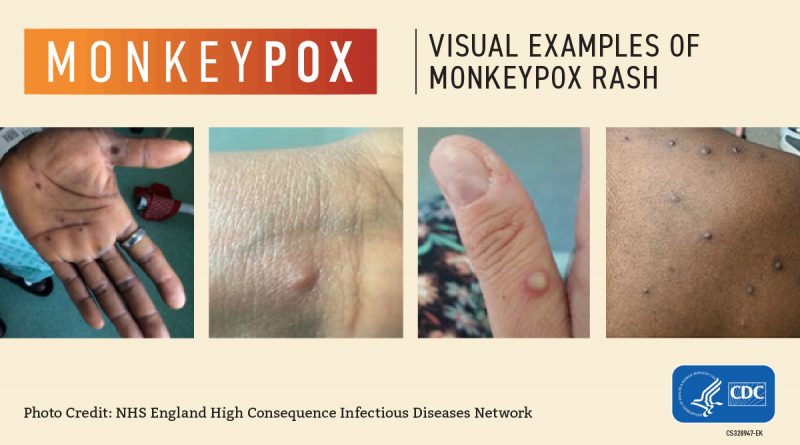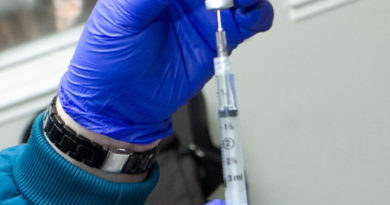Monkeypox: the latest outbreak
Monkeypox has been all over the news lately with the United States declaring a nationwide emergency and states like California, Illinois, and New York declaring their own state-wide emergencies over the virus. There’s a surge of misinformation going around social media about who the virus affects, and how it spreads.
To start off, what is Monkeypox?
According to the Humboldt Department of Health and Human Services (DHHS), Monkeypox is a rare zoonotic infection caused by the monkeypox virus, which is in the same family as the smallpox virus but less severe. The monkeypox virus is spread to humans from infected humans, animals, and materials contaminated with the virus.
How does it spread?
There are different ways that monkeypox spreads according to the Centers for Disease Control and Prevention (CDC).
- It can spread through close, personal, and skin-to-skin contact including direct contact with monkeypox rash, scabs, or bodily fluids.
- As well as touching objects, fabrics, and surfaces that have been in contact with someone with monkeypox.
- Contact with respiratory secretions
- Direct contact during sex
- Oral, anal, vaginal sex, and touching genitals or anus of someone with monkeypox
- Hugging, massage, and kissing
- Prolonged face-to-face contact
- Touching fabrics and objects during sex that were used by a person with monkeypox and that have not been disinfected, such as bedding, towels, fetish gear, and sex toys.
A pregnant person can also transmit the disease to their fetus through the placenta. It’s also possible for people to get monkeypox from infected animals, either by being scratched or bitten, preparing or eating their meat or by using products from the infected animal.
Symptoms
Monkeypox symptoms usually start within three weeks of exposure to the virus. If someone has flu-like symptoms, they usually develop a rash one to four days later.
Common symptoms include:
- Fever
- Headache
- Muscle ache and backache
- Swollen lymph nodes
- Chills
- Respiratory symptoms (e.g. sore throat, nasal congestion, or cough)
- A rash that may be located on or near the genitals, your hands, feet, chest, face, or mouth.
- The rash will go through various stages, including scabbing before healing
- The rash can look like pimples or blisters and they can be painful and itchy
It is essential to know that monkeypox can be spread from the time symptoms start until the rash is healed. This illness typically lasts 2-4 weeks.
Sexual Health
One of the biggest misconceptions about monkeypox is that it is a sexually transmitted disease and it only affects gay men. In reality anyone can contract monkeypox regardless of sexual orientation. Close to close contact is the way this disease is spread. Sex is one way for it to spread but there are a variety of non-sexual ways to contract it.
The CDC reports that the current outbreak of monkeypox has impacted mostly LGBTQ+ men and men who have sex with other men.
The CDC is recommending people to talk to their sexual partners about any recent illness or disease. As well as looking for any unexplained rashes on you or your partner’s body, including the genitals and anus. If you or your partner feel sick, don’t have sex and seek a medical provider.
If you decided to have sex, go to the CDC website to learn about the ways to protect you and your partner from transmitting the disease.
Prevention
The easiest way to prevent yourself from coming into contact with monkeypox would be to avoid skin-to-skin contact with people who have rashes that look like monkeypox, or anyone who is infected with monkeypox. Wash your hands often with soap and water or use hand sanitizer before eating or touching your face and after the bathroom.
Treatment
There isn’t any specific treatment for the monkeypox virus, but since monkeypox and smallpox viruses are genetically similar, it means that antiviral drugs and vaccines developed to protect against smallpox may be used to prevent and treat monkeypox.
Antivirals, such as tecovirimat (TPOXX), may be recommended for people who are more likely to get severely ill, like patients with weakened immune systems.
Humboldt County
As of Aug.5, there has been 1 reported case of monkeypox in Humboldt County. The DHHS Public Health had announced they received an allotment of 20 monkeypox vaccines earlier this month. About a quarter of the allotment will be used to vaccinate staff in Humboldt and Del Norte counties, who will be in charge of vaccinating members of the community. The additional vaccines will be available in case an outbreak occurs.
The DHHS Public Health also recently received more than 400 doses of an antiviral medication which would be made available for people with severe complications.
According to the Humboldt DHHS website, people at high risk for severe monkeypox who are immunocompromised, 8 years old or younger, pregnant or breastfeeding, or have a history of skin disease may also be eligible for the medication.
If you are experiencing symptoms or have been in contact with an individual who has tested positive for monkeypox, please contact your healthcare provider. If you do not have a provider, call Public Health at 707-445-6200. To learn more about prevention steps, visit the CDC at cdc.gov/poxvirus/monkeypox/prevention.html.




